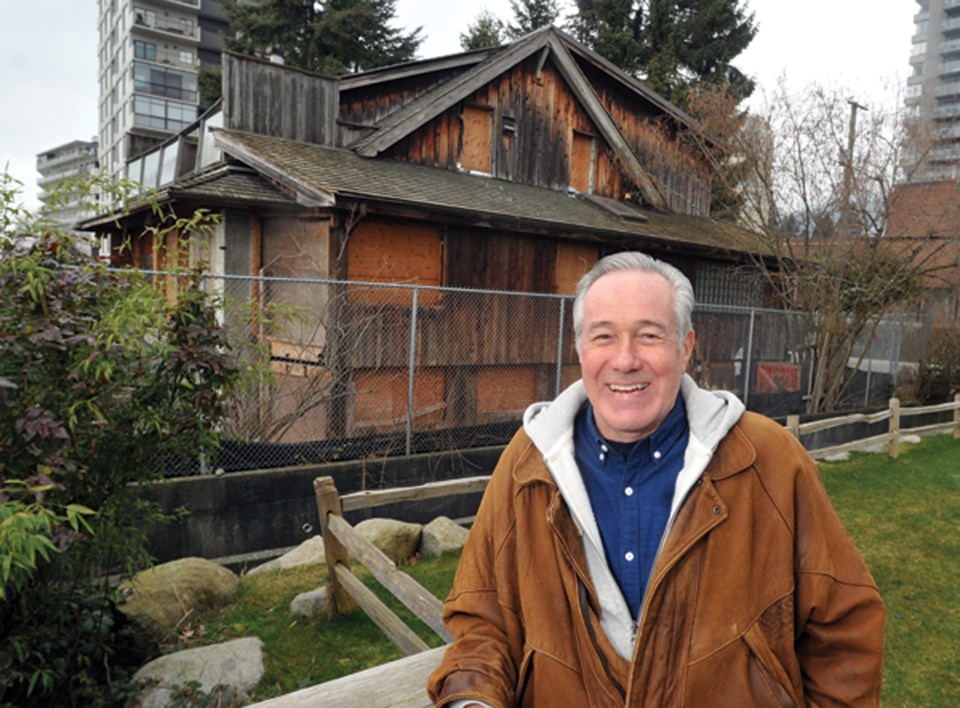It’s not much to look at now, but a group of West Â鶹´«Ã½Ó³»residents are hoping the oldest building on the North Shore – and one of the oldest in B.C. – can find new life as a waterfront cottage café.
“Coffee, muffin, and a side of history,” is the vision for Navvy Jack House, in the words of John Mawson, member of the Navvy Jack House Citizens Group.
But the plan is subject to a major private fundraising campaign.
In 2020, council came within one vote of demolishing the 150-year-old home of John “Navvy Jack” Thomas, the first settler to establish a permanent residence on the North Shore. Council relented to give time for heritage advocates to research possible new uses. A larger bistro operation was deemed not feasible by district staff, but several potential coffee shop operators expressed interest renting the restored house, which could also be eligible for a liquor licence.
More than an eventual source of revenue for the municipality, a restored Navvy Jack House would be a chance for council to preserve the municipality’s heritage and tell an important piece of history, Mawson said.
Thomas married Row-i-a, the granddaughter of Sḵwx̱wú7mesh Úxwumixw (Squamish Nation) Chief Kiepalano, one of the first instances of intermarriage between settler and an Indigenous person on the West Coast. They still have descendants alive today. The coffee shop concept didn’t result in any concerns from First Nations, a district staff report notes, although there is a desire to discuss how the building could be used for educational opportunities.
But, while there was general consensus that an Americano or glass of wine on Jack’s porch might be a nice thought, the place isn’t fit for company at the moment. It remains behind a chain-link fence, with its windows boarded up.
According to district staff, restoring the house and raising it to a safe level above storm surges will cost about $2.6 million – more than could be justified by any private business hoping to use the space. Council has agreed to put up $1 million collected through community amenity contributions. Following a vote March 7, council has given the citizen group a deadline of March 31, 2024, to find the remaining cash through their own fundraising, and grants from senior levels of government.
Before the vote, Navvy Jack advocate Tom Dodd noted that council frequently halts the demolition of privately owned heritage homes in hopes they can persuade the owner to restore them and give them heritage protection instead.
“I think this property presents a real opportunity for council to demonstrate some leadership in the community – to walk their talk, if you will,” he said. “So, as arguably the most important heritage asset owned by the district, I think Navvy Jack House deserves the same treatment.”
Dodd said he could start marshalling volunteers to help maintain the gardens around the home while the group secures the $1.6 million.
Council members greeted the proposal with varying degrees of enthusiasm.
Coun. Bill Soprovich was determined to see the house that Jack built stay.
“This is a historical site,” he said. “On this one, we have to raise that money.”
Others were more cautious, expressing worry the heritage project could end up becoming more of a burden for the district, either in terms of cost or staff time.
“I think it's going to be really important that the community group keep an eye on the target, both the financial target as well as the deadline, because I'm just concerned that things can go sideways really quickly,” said Coun. Marcus Wong.
Mayor Mary-Ann Booth expressed confidence in the group’s commitment to the fundraising and said it would be a “no-brainer” for senior levels of government to chip in with heritage grants, given that it is the longest continuously occupied home on the West Coast and that it helps share the story bridging Indigenous and settler cultures.
“We get over a million people walking by that house every year and what a great opportunity to generate some excitement about what this can look like,” she said. “Rather than a historical site that gathers dust, we’re gathering people and creating vibrancy. ... A glass of wine and a cup of coffee – the two favourite times a day – can be celebrated while looking at our beautiful waterfront, so I think this is a win-win-win.”


